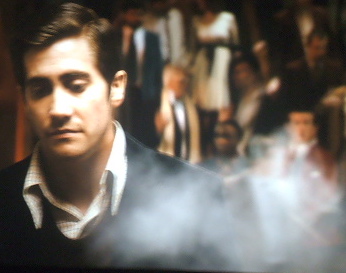
1. Opening Image (pg 1 – 3): The audience is first engaged with something compelling that sets the tone – and we begin to see how things as they are today.
While Davis (Jake Gyllenhaal) and his wife, Julia drive his BMW Sportster through Manhattan, she talks about a leak she’s noticed in their refrigerator. Davis has no idea about this, in fact he comes off as an uncaring, self-absorbed husband who is oblivious to his wife’s needs.
2. Catalyst (pg 3): An event rocks the main character’s world completely, and sets in motion the central problem of the story. It’s an external problem (not just internal, about thoughts and emotions) — it has clear and present stakes we can identify with and feel.
Davis and Julia are the victims of a violent crash, which kills Julia. Davis is in shock, he feels lost. What was his life about? What was his marriage about? What kind of person is he? He realizes never loved Julia.
This catalyst prompts him to explore who he is. He begins to grieve, in his own strange way.
3. Theme Stated (pg 14): Usually spoken to the main character in a snippet of dialogue, this gives a sense of the deeper issues that this story is “about.”
Phil, Davis’ father-in-law comforts him, saying “repairing the human heart is like repairing an automobile. You have to take everything apart. The anger, the love, the loss.”
4. Set-Up Section (pgs 1-11): We get to know the main character, who is living a compromised life in some way, while dealing with problems – and has something about them we can respect or like.
After a vending machine malfunctions, and he doesn’t get the M & Ms he paid for, Davis begins by writing intensely personal autobiographical letters to the customer service representative at the vending machine company. He is reaching out.
Through his letters to the vending machine company, we learn more about Davis’ life. He has an everyday routine, working for his father-in -law (Phil, played by Chris Cooper) at an investment company. He’s been on autopilot the whole time.
Davis shows up at work, and appears to be in denial about his wife’s death. His secretary is surprised he came to work at all. Davis declines to talk about his loss, and goes about his day at work.
Davis appears to be thoroughly dislikeable, yet funny in a dark sense. They closest thing to a “Save the Cat” moment, for him, is the sympathy we feel for him after his wife dies. As we watch him suffer in his own weird non-empathic way, we can’t help hoping that he can grow and cope.
5. Debate Section (pgs 12-25): The main character questions what has happened, tries to figure out what to do, and often seeks to avoid the true “call to adventure.”
The writer sets up a subplot between Phil and Davis on pages 14-15. Phil wants to take the 1.7 million dollars in life insurance due to Davis, to set up a scholarship in Julia’s name.
Unable to process much of anything yet, Davis agrees at first.
Davis begins to start grieving in his own way. He doesn’t know how. He opens up to a guy on the train who he’s talked to before.
He admits that everything he’s told this man is a lie – he doesn’t sell mattresses, he doesn’t like the Sox, in fact he hates baseball.
He admits that he didn’t love his wife, and he doesn’t feel sad that she’s died.
While on the train, he doesn’t notice that the customer service representative Karen (Naomi Watts) is following him for some reason.
He begins having daydreams about unpacking, and dismantling things.
At the airport, he pictures people’s baggage dumped into a pile on the floor. He pictures himself shooting a terrorist, defending his country.
He’s trying to figure out how to grieve, and how to unpack and understand his relationship with Julia. The debate is over on pgs 23-26.
6. Break into Two (pg 23- 26): Act 2. The main character becomes pulled into a world completely out of his element. He’s overmatched as the attempts to confront his story problem.
After weighing the advice from his father-in-law “you have to take everything apart,” Davis commits to a new course of action, he crosses the point of no return — he decides his course of grieving and processing will involve dismantling things, starting with the leaky refrigerator.
7. B Story (pg 27): A second story begins, which will run parallel to the “A Story”, and interweave with it throughout the rest of the movie. The theme and the character’s inner journey tends to be explored here.
Davis gets a phone call at two in the morning from Karen. (Romantic subplot). She was moved by his letters, they were so honest, and they made her cry. He feels a connection to her.
Davis decides they should meet. He’s moving into a new world, of action, of proactive grieving, and he decides to get closer to Karen.
8. Fun and Games Section (pg 29- 49): The entertaining aspects of the story’s premise are explored – which are fun to watch, but NOT fun for the main character, who is essentially in HELL until the end of the story.
Davis and Karen have a date, but do not actually meet. Davis goes into the diner they were supposed to meet at, while Karen stays parked outside, smoking pot, observing.
She calls him on his cell, and they talk. She appears to have problems with connecting with people, too. She doesn’t join his in the diner, but drives off.
Davis continues his search for answers, and tries a social experiment, handcuffing his briefcase to his own wrist, and walks around Manhattan. He seems to enjoy messing with people’s heads.
He dismantles and demolishes a cappuccino machine his wife had delivered to his home before she died.
He shows up at the vending machine company looking for Karen, but runs into a Carl, man (we’ll learn later) who’s her fiancé.
We meet Karen’s son Chris, who presents a science experiment at school, in which he blows up toy soldiers with an M 80, and sprays hair spray on it, so it goes up in flames. He explains to his class, that it’s a metaphor for war.
Karen isn’t sure what to make of her son’s sadistic streak.
We find out that Karen considers herself a loser, and a pothead. She is not really in love with Carl, but still rooms with him, but can’t bring herself to agree to marriage.
At work, Davis finds a squeaky stall door in the men’s room. Following his new commitment to demolish things, he tears it apart. Phil wants to know what’s going on?
Davis tells Phil, “I think I quit.” Phil tells him to take a couple months off, instead.
9. Midpoint (pg 49): The stakes are raised: the problem becomes more focused, more serious, more important and urgent.
After trying to quit, and getting time off instead, Davis tells himself, “From now on, it’s me and my tools.”
He drives by a construction site where the workers are demolishing a home, and joins in, taking a sledgehammer to the walls. He’s doubling down on finding answers by demolishing things.
10. Bad Guys Close In Section (pg 49- 87/90): Problems get worse and worse – the hero to be failing in their approach, and/or is facing more and more seemingly impossible obstacles.
Davis finds Karen’s address and visits her. She asks, “Are you going to disappoint me? Can you promise not to?”
Davis gets involved in the demolition of an amusement park.
Davis notices a station wagon following him. The audience wonders, is it Carl? Is it dangerous? Later we learn that Carl has a gun.
Davis goes to a doctor, claiming he can’t feel anything. He has a daydream about his heart being eaten by gypsy moths.
He goes back to the construction site and continues with the demolition of the house. He steps on a three inch nail and discovers that he can feel something. Pain.
Davis and Karen discuss “when was the last time you felt something?” He thinks about it and decides, in school, when he was running.
Davis runs into Chris at Karen’s house, where the boy is struggling with his “homosexual panic.” He pulls out a gun.
Davis stops him from hurting himself, and instead invites Chris to shoot him while wearing a bullet-proof vest, so he can feel it.
Davis has a daydream in which Julia asks him if he’s “taken me apart yet?”
Davis connects with Chris further, encouraging him to pretend to be interested in girls, then move to a gay-friendly city like San Francisco.
Davis gets hold of a bulldozer, and trashes his house. While tearing the house apart, he finds a sonogram, and realized that Julia was pregnant when she died. It’s a shock, and it saddens him.
11. All Is Lost (pg 87 -91): The story seems to be over, and the hero appears to have no hope. Everything the hero’s trying has failed, and they have no other options.
When he finds his wife’s sonogram (on page 87) Davis feels shocked, devastated and saddened very deeply.
For Chris; the boy gets brutally beat up by homophobic kids at school.
For the romantic subplot; Karen talks about Carl returning, on the phone, she tells him, “I miss you.” Is she deciding on Carl over Davis?
Karen kisses Davis, but there’s no reaction. Karen says, “it’s not fair that “you feel everything and I feel nothing.”
12. Dark Night of the Soul: (pg 87-91) The main character reels from the “all is lost” – and there’s often a “whiff of death.”
The “whiff of death” is apparent in this general area, including the discovery of the sonogram, and the reveal that not only Julia, but Davis’ baby has died, and with Chris taking Carl’s gun, driving off to get revenge.
13. Break into Three (pg 91): Act 3. A new idea, a new plan for solving the problem emerges (often the A Story and B Story “cross” – the B Story should also be unresolved and at its worst).
Davis invites Karen to a party at his father-in-law’s place. He’s formulated a plan that may resolve his relationship with Karen, and put an end to Phil’s scholarship idea, for Julia’s legacy.
He laughs out loud, as Phil introduces the first scholarship contenders. He stands up to Phil.
14. Finale Section (pg 91- 112): Solving the problem. The hero fails at first, and is pressed to his limit – confronts his own demons, and possibly changes his life – before the story problem is finally resolved.
Karen is embarrassed by Davis’ behavior at the party, and they argue. Karen sneaks out to smoke some pot. She tells Davis “I’m broken, too. I don’t know how to help you.”
Davis learns that the baby in the sonogram wasn’t his. Julia had an affair, when you weren’t paying attention to her. Meg (Phil’s wife) tells Davis, “you don’t matter.” Phil kicks Davis and Karen out of his party.
Page 99, Carl returns home to find Davis there with Karen. Davis stands up to Carl, but gets a brutal beating. Carl continues beating Davis, then tells him to fight back. Davis can’t.
Davis attempts to repair his relationship with Karen. He tries to meet her at the diner, the site of their first awkward “date.”
Karen tells Davis, “Carl’s forgiven me. I left him anyway.” She gives Davis a letter from Chris that tells Davis to meet him at a park on Saturday at 11 am.
Davis at the park – he witnesses the total demolition of three buildings. It’s a powerful image. Davis breaks down and cries, mourning all he’s lost. He can’t stop crying. This feels like the catharsis he’s been struggling to feel.
Davis meets with Phil at Jason’s pub. He wants to know what made Julia happy. Phil remembers, she was happiest riding the horses.
Davis then argues that the scholarship fund is not a fitting legacy for Julia. “It isn’t a legacy, it’s a bank account.”
David takes Phil to the amusement park he once demolished. The carousel has been completely restored. The place is full of life. A sign reads, “Julia’s Carousel.”
Davis walks around the amusement park, then begins to run, finally feeling some release.
Voice Over from his final letter says, “I didn’t learn to be a better person. I guess I just feel a little bit better. I feel like myself…”
15. Final Image (pg 113): Reflecting the new status quo now that this story is over.
Davis goes home to the rubble that’s left of his house, after he took the bulldozer to it. The mailman comes by and asks if Davis is doing some renovations. Davis says, “I’m thinking about it.”
It’s as if he’s done with demolition and is considering rebuilding. This hints at a new normal for Davis.
The mailman hands him a letter. Inside is a check from the vending machine company, along with a refund, for the M & Ms, a check for 75 cents.
If you’d like your screenplay analysed for strength in story structure, so you can send the best version of yourscript out, go to my website, or call me at 310-850-4707.
You only get one chance to send it out. Make sure it’s in the best possible shape fiYou’ve worked for months and years on it, don’t take chances when you can get feedback from a professional.
Image credit: Creative Commons, detail from zodiac, 2007 by Anthony Easton, is licensed under CC By 2.0



